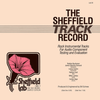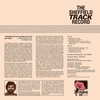



Robbie Buchanan, James Newton Howard, Lenny Castro, Nathan East, Mike Landau, Carlos Vega – The Sheffield Track Record (Direct to Disc, Unsealed)
RARITY – Unsealed
Bass – Nathan East
Drums – Carlos Vega
Guitar – Mike Landau
Keyboards – James Newton Howard, Robbie Buchanan
Percussion – Lenny Castro
Written by J.N. Howard (A1), J. Gruska (A2), P. Gordon (A2), C. Dore (B1), R. Buchanan (B1), R. Buchanan (B2)
1 LP, Gatefold Jacket
Limited edition
Unsealed (mint conditions)
Original analog Master Tape : YES
Direct to Disc
Heavy Press : 180 g
Record Color : Black
Speed : 33 RPM
Size : 12’’
Stereo
Studio
Record Press : unspecified (USA)
Label : Sheffield Lab
Original Label : Sheffield Lab
Recorded May 22, 1982 - Sheffield Lab Studios at MGM, Culver City, California
Engineered by Bill Schnee
Produced by Bill Schnee
Lathe Cut by Ron Hitchcock
Lathe Design by Ed Hukoveh
Plated by Dick Doss, Rick Goldman
Originally released in 1982
Tracks:
Side A:
1. Amuseum
2. The Higher You Rise
Side B:
1. Wise To The Lines
2. Le Ballade
Reviews:
"What, a recording of rock backup tracks? Who could care less? Me, is who. Quibble over the program if you will (actually, it isn't all that dull, and two of the numbers are fun to listen to), but this wasn't released for the program material. You might call it a tantalizing sample of where a lot of rock sound begins, before it is fuzzed, reverbed, and cross-dubbed God knows how many times before the final mess is released for the edification of the peons. This has to be one of the most astonishing rock recordings ever issued! The Absolute Sound's Harry Pearson (who obviously got his before we got ours, as you are reading this 9 weeks after our copy arrived) is quoted on the jacket as declaring this to be "Absolutely the best-sounding rock record ever made." He's right.
The sound is beyond belief! Incredible gut-shaking impacts, wall-flapping drum beats, and some awesomely stentorian synthesizer grunts, with some of the most unstrained, crystalline clarity and openness I have heard from any recording. (Although I'm not sure I agree with Sheffield's claim that this has more peak transient energy and more dynamic range than can be recorded by any other method, "be it analog or digital." If Sheffield had sent us our copy a week before, we could have used it to challenge the Sony PCM-F1, but one went out before the other came in. Actually, it hardly matters.)
If you thought Sheffield's Drum Record was a system buster, wait until you try this one! It's the first time I have ever heard the Acoustat TNT-2000 power amplifier gasping for breath, and I wasn't even listening that loudly. (I clocked 100dB on peaks with the IVIE IE-10 Analyzer. The amplifier strain sounded like a tiny signal compression immediately following each loud "whack!")
If you like this recording though, you'd better buy several copies; it has such high recorded velocities on it that you can safely assume it will wear out rapidly, whether you LAST it or not. I was inclined to suggest making a taped copy of it for repeated listening but, unless you own a PCM-FI (Ahem!), you can expect to lose a lot of signal quality when you try to put this on tape. The Track Record will never go down in the annals of recorded music, but as a sheer sonic tour-de-force I doubt that it will be surpassed for a long time. But then I seem to remember saying that about the Sheffield Drum Record." by J. Gordon Holt
Direct-to-disc (D2D) recording refers to sound recording methods that record audio directly onto analog disc masters bypassing steps as master tapes, overdubs, and mix downs from multi-tracked masters. This approach avoids problems of analog recording tape such as tape hiss (high frequency noise).
Ratings :
Discogs : 3.94 / 5

